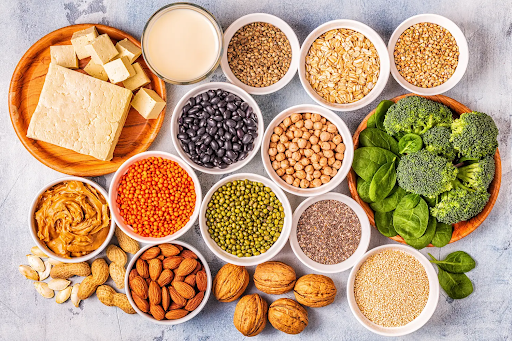What Makes Plant Based Chicken the Go-To Protein for Health Enthusiasts?
Wiki Article
Everything About Healthy Food: Benefits of Embracing Plant Based Options
The conversation bordering plant-based diet regimens has actually gotten considerable interest recently. Numerous individuals are exploring the possible wellness benefits, nutritional advantages, and ecological effects connected with these dietary choices. As individuals end up being extra knowledgeable about their food's impact on wellness and sustainability, questions arise concerning the usefulness of embracing such a lifestyle. What specific adjustments can one expect, and how might these selections improve not only individual health yet likewise the planet's future?Recognizing Plant-Based Diet Plans
Although numerous people link plant-based diet plans mainly with vegetarianism or veganism, these diet regimens can encompass a vast array of consuming patterns that focus on whole, minimally refined plant foods. Such diets usually include fruits, veggies, whole grains, seeds, vegetables, and nuts, while eliminating or limiting pet products. This versatility permits individuals to tailor their nutritional choices according to nutritional requirements and individual preferences. Some may take on a mainly plant-based diet regimen while still occasionally consuming meat or dairy products, frequently described as a flexitarian approach. The emphasis continues to be on incorporating more plant foods, which can cause a varied array of flavors and meals. Recognizing these numerous interpretations of plant-based eating is necessary for valuing its accessibility and charm in contemporary food society.Wellness Advantages of Plant-Based Foods
The health and wellness advantages of plant-based foods are considerable, supplying a nutrient density advantage that supports general wellness. Research study shows that these foods can boost heart health and play a crucial role in effective weight management. By integrating much more plant-based choices, individuals may improve their dietary choices and promote long-term health.Nutrient Density Benefit
Nutrient thickness plays a crucial duty in the wellness advantages of plant-based foods, making them an engaging option for those seeking a balanced diet. Plant-based foods, such as fruits, veggies, beans, nuts, and entire grains, are commonly abundant in vital vitamins, minerals, and antioxidants while being lower in calories. This high nutrient thickness permits individuals to consume fewer calories while still fulfilling their dietary requirements. Additionally, these foods are loaded with nutritional fiber, promoting digestive health and assisting in weight administration. By integrating nutrient-dense plant-based options, customers can boost their total health and wellness, support their immune systems, and lower the danger of chronic conditions. Eventually, the nutrient density of plant-based foods emphasizes their significance in a health-conscious way of living.Heart Health And Wellness Renovation

Weight Administration Support
In enhancement to promoting heart health, a plant-based diet regimen can significantly assist in weight administration. This nutritional strategy highlights whole foods such as fruits, veggies, legumes, nuts, and entire grains, which are typically reduced in calories and higher in fiber contrasted to animal-based products. The high fiber web content helps increase satiation, reducing total calorie intake. Furthermore, plant-based diet regimens are typically rich in necessary nutrients while low in harmful fats, making it simpler to keep a healthy weight. BBQ Sauces. Study indicates that people that adopt a plant-based way of life often tend to have lower body mass indexes (BMIs) and experience more successful fat burning compared to those who take in meat-heavy diet regimens. Welcoming plant-based alternatives is a strategic choice for efficient weight administration.
Nutritional Worth of Plant-Based Active Ingredients
Plant-based ingredients are rich in important nutrients, using a varied selection of vitamins, minerals, and anti-oxidants that add to general wellness. A contrast of healthy protein resources discloses that while pet items are often checked out as exceptional, numerous plant-based alternatives give adequate protein and various other beneficial compounds. Understanding the dietary worth of these components can help individuals make educated nutritional selections.Essential Nutrients in Plants
Nutrient-rich ingredients located in plants supply a varied variety of necessary minerals and vitamins that add significantly to overall health. These ingredients are rich in vitamins A, C, and K, which support immune feature, vision, and blood clot, respectively. Additionally, plants provide vital minerals such as calcium, magnesium, and potassium, critical for heart wellness, muscle mass function, and bone toughness. The existence of fiber in plant-based foods aids food digestion and promotes a healthy intestine microbiome. Antioxidants, located generously in vegetables and fruits, assistance combat oxidative stress and anxiety and minimize inflammation. Many plant foods are reduced in calories yet high in nutrients, making them an excellent selection for those seeking to preserve a healthy and balanced weight while making sure ideal nutrient intake.:max_bytes(150000):strip_icc()/EWL-plant-based-foods-with-more-protein-than-an-egg-8424134-hero-3x2-42d27feb38e94570a6e5203bb0e4e666.jpg)
Comparing Healthy Protein Sources
Protein sources vary considerably in their nutritional accounts, with plant-based active ingredients using unique benefits. Unlike pet healthy proteins, which typically include saturated fats and cholesterol, plant healthy proteins tend to be lower in these unhealthy components. Legumes, nuts, seeds, and whole grains are abundant in crucial amino acids, fiber, vitamins, and minerals. Lentils give high healthy protein content alongside substantial iron and folate, while quinoa is a total protein, supplying all nine essential amino acids. In addition, plant-based proteins are often come with by anti-oxidants and phytochemicals that support general health. The change to plant-based healthy protein sources not just improves dietary intake but also lines up with sustainable nutritional practices, minimizing environmental influence and promoting lasting health benefits.Ecological Impact of Plant-Based Consuming
As awareness of environment modification grows, several individuals are exploring lasting dietary selections that can significantly decrease their environmental footprint. Plant-based consuming has actually emerged as a substantial contributor to lowering greenhouse gas discharges, which are primarily related to livestock manufacturing. The farming of fruits, vegetables, vegetables, and grains typically needs fewer sources, such as water and land, compared to animal farming. In addition, plant-based diet regimens can bring about reduced logging, as much less land is required for grazing livestock or expanding pet feed. By shifting towards plant-based choices, customers can support biodiversity and advertise much healthier ecosystems. In general, accepting plant-based consuming not only benefits personal health and wellness however additionally stands for an important step toward environmental sustainability and preservation efforts.Overcoming Common Misconceptions
While lots of people acknowledge the advantages of a plant-based diet, a number of mistaken beliefs usually deter them from fully accepting this way of living. An usual idea is that plant-based diet plans do not have enough healthy protein; nonetheless, various plant resources, such as vegetables, nuts, and tofu, supply enough protein. Additionally, some assume that this diet regimen is costly, when in reality, staples like beans, rice, and seasonal veggies can be quite budget friendly. An additional misunderstanding is that plant-based eating is excessively limiting, whereas it actually supplies a diverse variety of flavors and foods. Finally, lots of fret that a plant-based diet regimen may cause deficiencies, yet with proper planning, people can obtain all essential nutrients, consisting of vitamins and minerals, while delighting in a wide range of delicious dishes.Tips for Transitioning to a Plant-Based Way of life
Making the change to a plant-based way of life can be an enhancing experience, though it usually requires some assistance to navigate the first changes. Initially, individuals are urged to begin slowly, including even more fruits, vegetables, vegetables, and entire grains into their dishes while minimizing meat and milk consumption. Dish preparation is crucial; preparing a regular food selection can help reduce the modification and avoid final unhealthy selections. Checking out new recipes and cooking approaches can also boost the experience and preserve enjoyment regarding plant-based consuming. Additionally, joining support system or areas can offer motivation and share beneficial pointers. Staying educated about nourishment assurances well balanced dishes, avoiding shortages while promoting a healthy, satisfying plant-based lifestyle.
Delicious Plant-Based Meal Concepts
Checking out delicious plant-based meal ideas can motivate people to welcome a much more nutritious diet regimen. One popular choice is a passionate quinoa salad, featuring cherry tomatoes, cucumber, and a tangy lemon-tahini dressing. One more favorite is a savory lentil stew, packed with carrots, celery, and fragrant herbs, perfect for a comforting supper. For breakfast, overnight oats made with almond milk, chia seeds, and topped with fresh berries provide a healthy beginning to the day. Furthermore, a vibrant vegetable stir-fry with tofu and a variety this of vivid veggies can be a fast yet satisfying dish. Ultimately, creamy avocado toast on whole-grain bread, sprayed with seasonings and seeds, supplies a straightforward yet flavorful treat. These meals showcase the variety and richness of plant-based consuming.
Frequently Asked Inquiries
Can a Plant-Based Diet Provide Enough Protein?
The inquiry of whether a plant-based diet regimen can give enough healthy protein prevails. Various resources, including vegetables, nuts, seeds, and whole grains, can meet healthy protein needs successfully, supporting a healthy and well balanced diet plan for individuals.Are Plant-Based Diet Plans Ideal for Children?
The viability of plant-based diet regimens for kids relies on cautious planning. Appropriate nutrients must be ensured, including vitamins, minerals, and proteins. With correct guidance, such diet plans can support healthy and balanced growth and growth in kids.Exactly how Do I Dine Out on a Plant-Based Diet regimen?
Eating in restaurants on a plant-based diet regimen entails seeking restaurants with diverse menus, requesting for alterations, and checking out vegan-friendly alternatives. Preparation in advance and communicating nutritional preferences can improve the eating experience while preserving nutritional options.What Are Common Irritants in Plant-Based Foods?
Usual allergens in plant-based foods consist of soy, gluten, nuts, and seeds - Sugar Free Sauces. People following a plant-based diet ought to be conscious of these irritants and review labels very carefully to avoid damaging responses and assure safe usageCan Plant-Based Diets Aid With Fat Burning?
Study indicates that taking on a plant-based diet may facilitate check here weight loss due to its normally lower calorie density and greater fiber web content. This mix can improve satiation, aiding people handle their calorie intake effectively. Several people link plant-based diets mostly with vegetarianism or veganism, these diet plans can include a large variety of consuming patterns that prioritize entire, minimally refined plant foods. Nutrient thickness plays an important function in the health benefits of plant-based foods, making them an engaging selection for those looking for a well balanced diet. Plant-based diet regimens have actually been shown to noticeably enhance heart health and wellness, as they commonly contain components that support cardiovascular function. In enhancement to promoting heart health and wellness, a plant-based diet can considerably help in weight administration. A common idea is that plant-based diet regimens redirected here do not have adequate healthy protein; nonetheless, numerous plant resources, such as vegetables, nuts, and tofu, supply enough healthy protein.Report this wiki page